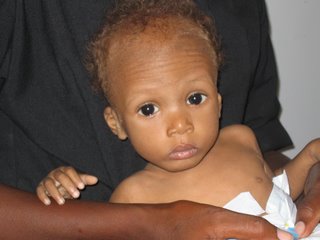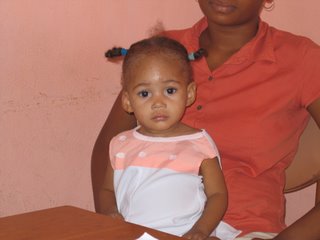
OSF Cuts Haitian Hearts Funding
Shortly after I was fired from OSF in December, 2001, OSF-SFMC spokesman Chris Lofgren told the Journal Star that my termination would not have any impact on Haitian Hearts. Paul Kramer, Executive Director of Children’s Hospital of Ilinois, wrote a letter to Children’s Hospital of Illinois contributors, reassuring them of Haitian Hearts viability. However, Kramer would not sign his own letter, even when Haitian Hearts insisted that he do so, and he had the wife of one of the pediatric cardiologists sign it. Children’s Hospital did not want to lose any contributions from people that had been generous to Haitian Hearts and Children’s Hospital after I was fired. We knew that Keith Steffen was saying he would cut funding to Haitian Hearts, we just did not know when. Did Paul Kramer know this when he wrote the letter that he wouldn’t sign?
I worked in Haiti during 2002 and brought kids back for surgery at OSF. Haitian Hearts volunteers continue to raise money for Children’s Hospital for the kids surgery.(We raised 445,000 dollars and contributed it to Children’s Hospital during 2002.)
However, just as we expected, and contrary to what OSF led the public to believe in the media, on July 12, 2002, OSF administration cut all of the funding for Haitian children’s heart surgeries just like Steffen had been saying behind closed doors.
When Kramer called the American Consulate in Haiti in December, 2002, he did even more damage to kids that needed to come to Peoria for life saving surgery.
-------------------------------------
Below is a letter written by Dr. Stephen Bash extolling the virtues of the Haitian Hearts program. It was written one year before I was fired from OSF and 2 years from the time OSF cut all funding.
Pediatric Cardiology
William H. Albers, M.D. J.J. Shah, M.D.
Stephen E. Bash, M.D. Douglas J. Schneider, M.D.
November 17, 2000
Representative Ray LaHood
100 N.E. Monroe Rm 100
Peoria, II 61602
Dear Representative LaHood:
I am writing to you in support of the Haitian Heart Program, sponsored by the Children's Hospital of Illinois at OSF/St. Francis Medical Center in Peoria. Our group, Pediatric Cardiology Associates, has been giving free care to these children over the past ten years.
Dr. John Carroll, Emergency Department physician at OSF, has on his own gone to Haiti and screened the children who had potential fixable congenital heart disease, and has brought them back to the Children's Hospital of Illinois for corrective surgery. These children have life threatening congenital heart disease, for which they would have no chance of survival, or limited chance of survival, if left uncorrected.
We have an arrangement with the pediatric cardiovascular surgeons, anesthesiologists, radiologists, intensivists, and our group to provide for these children free of charge. There is a basic cost involved at the Children's Hospital which is necessary to allow us to continue to treat these children. OSF and the Children's Hospital have the policy of treating all children who are in need.
Dr. Carroll has been superb in screening these children in Haiti, and picking out the once that we have the best chance of correcting the heart defect, allowing these children to survive. He needs support in order for us to help carry on this mission.
Any help that you can give to us so that we can allow this program to continue would be greatly appreciated.
Sincerely and Best Regards,
Stephen E. Bash, M.D.
Pediatric Cardiologist
SEB:llb
cc: Paul Kramer
Executive Director
Children's Hospital of Illinois
---------

Peoria Journal Star Op-Ed by Maria King--August 11, 2002
Haitian hearts, moral duty What do average Americans owe the foreign poor? More than we give
August 11, 2002
By MARIA KING
What do we owe the poor? I have been thinking about this lately, prompted in part by OSF St. Francis Medical Center's decision to cut off its annual $257,000 contribution to the Haitian Hearts program. I find OSF's choice painful for many reasons - as a Catholic, a visitor to Haiti and a friend of Dr. John Carroll, who founded the program.
But it also triggers a question: "What should I, a middle-class American, with my busy life, my own set of problems and obligations, my hopes and goals for the future, do to help the poor in developing countries?"
It is a discomforting question. Religious and secular references provide direction. The Catholic Church has a long and challenging tradition on obligations to the poor. Take this from The Church in the Modern World, a document from Vatican II: "Faced with a world today where so many people are suffering from want, the council asks individuals and governments to remember the saying of the Fathers: 'Feed the people dying of hunger, because if you do not feed them, you are killing them.' "
Or this from Pope Paul VI's encyclical (1967) On the Development of Peoples: " ... the superfluous wealth of rich countries should be placed at the service of poor nations. The rule which up to now held good for the benefit of those nearest to us, must today be applied to all the needy of this world."
As much as I like luxuries and occasionally buy a lottery ticket, I know by virtue of the timing and place of my birth that I've already won the lottery. I possess wealth beyond the hopes of 90 percent of humanity, and I spend most of it on myself.
For more guidance, I turned to The Faces of Injustice, a book written by the late Harvard political theorist, Judith N. Shklar. "It will always be easier to see misfortune rather than injustice in the afflictions of other people," writes Shklar, and indeed many would probably define poor Haitians as unfortunate rather than aggrieved. Misfortune has an air of what-can¬you-do inevitability about it, while injustice cries for action. The attitude, "Hey, life's unfair," can lead to what Shklar calls passive injustice. Passive injustice occurs when people do nothing in the face of suffering and by doing nothing contribute to injustice.
There are billions of poor people. Really, how can I change the political and economic systems that create this situation? One person can't cure all the world's problems, but I can do my part.
The downside of looking at the state of the world and considering what should be done about it is that the paradise known as ignorance evaporates. There's a great scene in the movie Broadcast News. Holly Hunter, who plays an idealistic TV news producer, has buttonholed one of the network's head honchos at a party and is demanding action to address the latest injustice. The bigwig sneers, "It must be nice to always believe you know better." Hunter replies with an anguished look on her face, "No, it's awful."
The reason "it's awful" is because when you know the facts - that Haiti a country of 8 million people where half of all children under five are malnourished, only a quarter of the people have safe drinking water, half of the adults are illiterate and the per capita income is less than $1 a day - you feel compelled to act. Action requires effort and sacrifice, but not to act in the light of knowledge means sacrificing something more important than material goods: part of your humanity.
There's also a different kind of knowing than just the facts. Often we only feel urgency to help those to whom we are emotionally attached. This has been one of the great benefits of the Haitian Hearts program. People who travel to Haiti, or care for these children while they await and recover from surgery, or are otherwise involved with the program get to know and love these children. Through them, Haiti becomes tangible and not some Third World abstraction. Without this attachment, people are too willing to rationalize the misery of others.
Why should Haiti, a country that my Rand McNally atlas describes as "by every account a mess," have a special claim on our consciences? Consider this: never in history have there been two countries with such opposite standards of living so geographically close to each other. Haiti is as close to the United States as Peoria is to Wichita, Kans.
Haitian parents love their children just as much as we do but often can't give them life's necessities. Will our descendants say about us, "How could they let people starve or die from drinking dirty water and untreated medical conditions when they had so much?"
Though the sources I consulted make convincing arguments for more action, I think we possess an impulse that guides us to the same conclusion. This impulse has been codified as the Golden Rule, and so I ask myself, "If I had been born in Haiti and lived in such appalling conditions, what would I hope for from my American neighbors?"
The answer to the first question I posed and this one is the same:
More than I am doing now.
Maria King is a graduate student in English at Bradley University. She went to Haiti as part of a local mission effort in 1990.

1 comment:
Many people are seeking their "reward" here on earth. they fail to realize this is just the testing ground for what comes after.Like it or not we ARE "our brother's keeper" How can we "raise" adult people That big hole that never gets filled MORE MORE MORE here in America is GOD trying to get our attention Its all a vicious cycle whether its money power recognition etc etc you cant go to a store without hearing at least one or two kids screaming and having tantrums for MORE MORE MORE I feel so ashamed for them as well as their parents. I believe everyone should have the basic necressitys of life food medicine clean water the haiten children still have their greatest treasure a heart that still has plenty of room for god to enter. so many see a place like haiti and feel a smug sense of security in being an American at the same time not realizing how poor we are also.Seek ye first the kingdom of God and the rest will be added unto you. Could it mean PEACE?? Peace in the realization that we are doing all we can to lead the poor as well as the poor in spirit into the kingdom of God?
Post a Comment